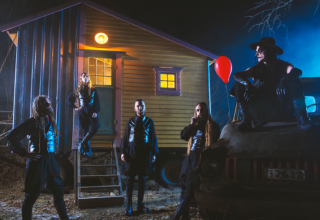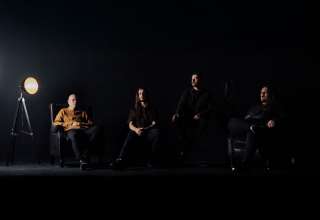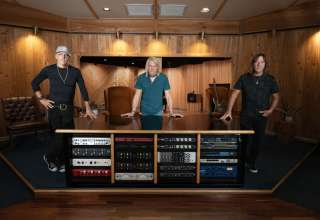Review by Rick Eaglestone for MPM
Right, let me get something straight from the off – Paradise Lost do not need me to tell you they are legends. After thirty-five-odd years of crafting some of the most emotionally devastating and sonically crushing music known to humankind, Nick Holmes and the lads could record themselves reading the phone book backwards and I would still find something profound in it. But here is the thing about legends – they have got to keep earning that status, haven’t they? And with *Ascension*, their seventeenth full-length offering, Paradise Lost have done exactly that.
It has been five years on from*Obsidian* graced our ears, and while the pandemic had a hand in that extended gap, it has given the Halifax heroes time to craft something genuinely special. Mind you, they were not exactly sitting on their hands during lockdown – Greg Mackintosh and Holmes kept busy with Host’s *IX* album, which served as both a creative outlet and a warm-up for what was to come.
The wait, however, has been worth every agonising moment.
*Ascension* opens with the kind of confidence that only comes from decades of knowing exactly who you are. From the moment those first notes crawl out of your speakers like some gothic leviathan emerging from the depths, you know you are in for something special. The production – crisp yet crushing, modern yet timeless – immediately sets the tone for an album that feels both familiar and refreshingly vital.
“Serpents On The Cross” serves as the perfect opener, a slow-burning anthem that showcases everything that makes Paradise Lost essential. Holmes’s vocals have aged like a fine wine – or perhaps more appropriately, like a vintage absinthe – retaining all their power while gaining layers of emotional complexity that only come with experience. The interplay between his clean vocals and the occasional growl is masterful, never feeling forced or nostalgic, but rather like a natural evolution of where the band finds itself in 2025.
Greg Mackintosh’s guitar work throughout *Ascension* is nothing short of sublime. The man’s always been able to craft riffs that feel both monumentally heavy and heartbreakingly beautiful, and here he is firing on all cylinders. The lead work on tracks like “Salvation” demonstrates his ability to make every note count, weaving melodies that burrow deep into your consciousness and refuse to leave. There’s a maturity to his approach here that speaks to years of refinement – he’s not trying to prove anything to anyone, just serving the songs with the kind of tasteful brilliance that separates the master’s from the pretenders.
“Silence Like The Grave,” the album’s first single, perfectly encapsulates what makes *Ascension* such a triumph. Holmes describes it as “one of the more up-tempo” tracks, and while that might be relative in Paradise Lost terms, it has an urgency and drive that is infectious. The chorus hits like a sledgehammer wrapped in velvet, combining crushing heaviness with an emotional weight that will leave you breathless. It is the kind of song that reminds you why Paradise Lost have been influencing bands for decades – they make this combination of beauty and brutality look effortless.

“People should expect us to get more miserable,” jokes frontman Nick Holmes when asked what fans might anticipate from PARADISE LOST in 2025. Explaining the album’s title and the lyrics, however, it’s clear that they remain masters of their art when it comes to delivering on such things. “The album title is taken from the belief in rising to the better place, in fiction from Earth to heaven, and all the requirements that go with that,” he elaborates. “In real life, people are often striving to get to a better place from birth, trying to be a better person, regardless of the fact that the only reward is death.”
But it’s not just about the individual tracks – *Ascension* works as a cohesive journey in a way that many modern albums simply do not. There is an ebb and flow to the sequencing that speaks to the band’s understanding of dynamics and pacing. The doom-laden passages are given room to breathe, allowing their full emotional impact to land, while the more aggressive moments hit with surgical precision.
Lyrically, Holmes continues to explore themes of mortality, spirituality, and human suffering with the kind of poetic darkness that has become his trademark. The album’s title and cover art featuring “The Court Of Death” (1870-1902) immediately signal the band’s continued fascination with life’s bigger questions, but there is nothing pretentious or overwrought about the approach. These are songs that grapple with genuine human experiences, delivered with the kind of authenticity that comes from lived experience rather than intellectual posturing.
What strikes me most about *Ascension* is how effortlessly it balances Paradise Lost’s various eras and styles. There are echoes of the crushing doom of their early work, the gothic grandeur of their mid-period, and the refined heaviness of their recent output, all woven together into something that feels both retrospective and forward-looking. It is the work of a band that is comfortable in their own skin, unafraid to embrace their legacy while continuing to push boundaries.
The album’s middle section, particularly tracks like “Sirens” and “The Precipice,” showcase the band’s ability to create genuine atmosphere. These are not just heavy songs with pretty bits – they are carefully constructed emotional journeys that demonstrate why Paradise Lost have remained relevant for so long. The interplay between light and dark, beauty and brutality, hope and despair, is handled with the kind of subtlety that only comes from years of experience.
As we move into the album’s final act, the sense of resolution is palpable. Without giving too much away, the closing tracks provide both catharsis and contemplation, wrapping up the journey in a way that feels both satisfying and slightly open-ended. It is the mark of songwriters who understand that the best endings do not tie everything up in neat little bows – they leave you with something to think about.
Looking at *Ascension* in the context of Paradise Lost’s extensive catalogue, it feels like a natural progression rather than a dramatic departure. The band have clearly learned from every phase of their career, incorporating the best elements of each era while avoiding the pitfalls that might have plagued lesser efforts. It is mature without being stodgy, heavy without being mindlessly brutal, and emotional without being maudlin.
The album’s exploration of spiritual themes – despite Holmes’s assertion that they “won’t offer any religious enlightenment” – feels genuine and thoughtful rather than cynical or exploitative. These are songs that grapple with big questions without pretending to have easy answers, which is exactly what you would hope for from a band at this stage of their career.
For longtime fans, *Ascension* will feel like coming home after a long journey. For newcomers, it serves as an excellent introduction to everything that makes Paradise Lost special. And for those of us who have been along for various parts of the ride, it is a reminder of why we fell in love with this music in the first place.
If you are looking for the perfect soundtrack to the approaching winter months, or if you simply want to hear what genuine masters of their craft sound like when they’re at their best, *Ascension* is simply perfect as It’s heavy, beautiful, and emotionally devastating.
Welcome back, Paradise Lost. We’ve missed you.
Album of year – Nailed
Ascension track listing:
01 Serpent On The Cross
02 Tyrants Serenade
03 Salvation
04 Silence Like The Grave
05 Lay A Wreath Upon The World
06 Diluvium
07 Savage Days
08 Sirens
09 Deceivers
10 The Precipice
11 This Stark Town
12 A Life Unknown
Line-up:
Nick Holmes | Vocals
Gregor Mackintosh | Lead & Rhythm Guitar
Aaron Aedy | Rhythm Guitar
Steve Edmondson | Bass
Guido Montanarini | Drums
https://www.facebook.com/paradiselostofficial
https://www.instagram.com/officialparadiselost
https://www.youtube.com/user/paradiselostuk
10/10







